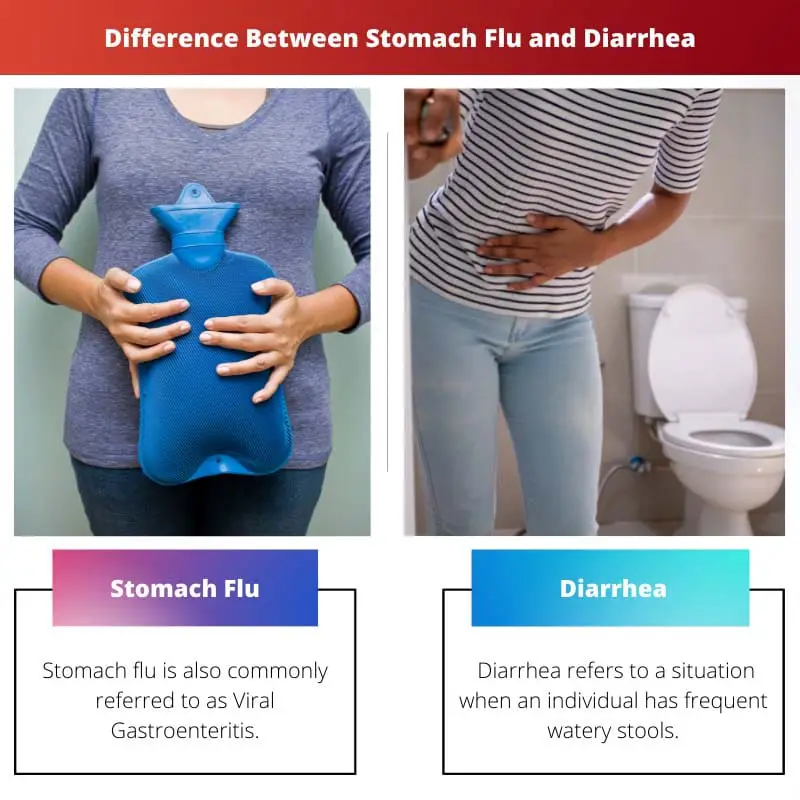Stomach infections are a result of consuming contaminated food, water and reaction to a medication. These might lead to food poisoning, diarrhoea, or stomach flu.
These diseases are mostly cured easily. However, proper diagnosis and treatment are mandatory to avoid any further repercussions.
Stomach Flu and Diarrhea are confusing for some people.
Key Takeaways
- Stomach flu, or gastroenteritis, is an inflammation of the gastrointestinal tract caused by viruses, bacteria, or parasites, whereas diarrhea is a symptom characterized by loose, watery bowel movements.
- Stomach flu presents with additional symptoms like nausea, vomiting, and abdominal cramps, while diarrhea may occur independently or as a result of other conditions.
- Treatment for stomach flu focuses on hydration and symptom management, while diarrhea treatment depends on the underlying cause, which may include infections, food intolerances, or other medical conditions.
Stomach Flu vs Diarrhea
Stomach flu, also known as viral gastroenteritis, is a viral infection that affects the stomach and intestines and causes symptoms like nausea, vomiting, and diarrhoea. Diarrhoea is caused by many different factors, like viral infections, and is characterized by loose, watery stools.

Stomach flu is also commonly referred to as Viral Gastroenteritis. Norovirus, Rotavirus, and Astrovirus are the three main viruses that cause stomach flu.
The disease is most acute. But it is highly contagious. The main reason for developing this disease is the lack of a healthy lifestyle and hygiene.
Diarrhoea refers to a situation when an individual has frequent watery stools. The main causes include bacterial and viral infection, parasitic infestations, contaminated food or water intake, medication, lactose intolerance, and disorders.
It is highly contagious and can spread through various factors. Therefore, it is necessary to take precautions for the same.
Comparison Table
| Parameters of Comparison | Stomach Flu | Diarrhea |
|---|---|---|
| Symptoms | The symptoms include watery diarrhea, abdominal cramps, nauseated feeling, vomiting, and fever. Weakness and dehydration are also faced by some. | The symptoms include abdominal cramps, nauseated feeling, vomiting, fever, blood or mucus in stool, frequent bowels, weakness, and dehydration. |
| Infectious agents | The main causes are the viruses: norovirus, rotavirus, astrovirus. | The main causes include viral infections, bacterial infections, medications, and alcohol. |
| Terminology | It is commonly referred to as viral gastroenteritis. | There is no other term used. |
| Treatment | It is a self-resolving disease. A few antibiotics or home remedies can help. | Treatment is based on the type of diarrhea. Water or fluid intake should be increased to deal with dehydration. |
| Reason | The reason for developing this disease is the lack of a healthy lifestyle and hygiene. | The reason for developing this disease is due to the entry of an infectious agent. |
What is Stomach Flu?
Stomach flu is also commonly referred to as Viral Gastroenteritis. Norovirus, Rotavirus, and Astrovirus are the three main viruses that cause stomach flu.
The disease is most acute. But it is highly contagious.
The main reason for developing this disease is the lack of a healthy lifestyle and hygiene. It is important to eat healthy food.
Proper washing of vegetables, utensils, and hands before preparing or having a meal is mandatory. This also helps in developing a good immune system to fight viruses.
The symptoms include watery diarrhoea, abdominal cramps, nauseated feeling, vomiting, and fever. Some also face weakness and dehydration.
Other symptoms may also include overall body pain, muscle pain, chills, and loss of appetite. Here Dehydration can be a problem as a result of the decrease in body fluids and electrolyte imbalance.
Therefore intake of fluids should be increased.
For diagnosing stomach flu, an individual should check the CBC (complete blood count). This is done in order to check the amount of increased White Blood Cells.
This helps by displaying the infected stomach or intestines. Further tests are run in the case of chronic ones, including stool tests.
It is a self-resolving disease. A few antibiotics or home remedies can help.

What is Diarrhea?
Diarrhoea refers to a situation when an individual has frequent watery stools. The main causes include bacterial and viral infection, parasitic infestations, contaminated food or water intake, medication, lactose intolerance, and disorders.
It is highly contagious and can spread through various factors. Therefore, it is necessary to take precautions for the same.
It is also identified as the stomach flu’s most common symptom. It can be classified into acute, chronic, and persistent diarrhoea.
The Giardia lamblia infection is another type of diarrhoea also known as the traveler’s diarrhea. Furthermore, it can be divided into osmotic, secretory, and exudative diarrhoea.
Most of the time, patients also experience abdominal cramps, nauseated feelings, vomiting, fever, blood, or mucus in stool. Another major problem is dehydration.
This is a result of the decrease in body fluids and electrolyte imbalance.
It can cause fatigue, a decrease in the outflow of urine, low blood pressure, a dry, parched tongue, and weakness. It can also cause sweating and overall body pain.
Problems caused by dehydration, especially in the case of infants, can be dangerous. It is advised to take help from a medical professional.
The treatment is based on the type of diarrhoea.

Main Differences Between Stomach Flu and Diarrhea
- In the case of Stomach Flu, the symptoms include watery diarrhoea, abdominal cramps, nauseated feeling, vomiting, and fever. Weakness and dehydration are also faced by some. In the case of Diarrhea, the symptoms include abdominal cramps, nauseated feeling, vomiting, fever, blood or mucus in stool, frequent bowels, weakness, and dehydration.
- In the case of Stomach Flu, the main causes are norovirus, rotavirus, and astrovirus. In the case of Diarrhea, the main causes include viral infections, bacterial infections, medications, and alcohol.
- Stomach Flu is commonly referred to as viral gastroenteritis. There is no other term used for Diarrhea.
- Stomach Flu is a self-resolving disease. A few antibiotics or home remedies can help. Treatment is based on the type of diarrhoea. Water or fluid intake should be increased to deal with dehydration.
- The reason for developing Stomach Flu disease is a lack of healthy lifestyle and hygiene. The reason for developing Diarrhea is due to the entry of an infectious agent.

- https://www.tandfonline.com/doi/abs/10.4161/gmic.1.1.11036
- https://www.sciencedirect.com/science/article/pii/S2255482311700947

The lack of a healthy lifestyle and hygiene is indeed a significant factor in the development of stomach flu. This article offers comprehensive insights into the causes and symptoms of these conditions.
Absolutely, Kwalker. The emphasis on the importance of hygiene and healthy practices is well-highlighted in the article.
I completely agree. Understanding the reasons behind these health issues is crucial for prevention and effective management.
While the article provides valuable information, I believe it could benefit from more statistical data and medical references to support its claims.
The detailed comparison between stomach flu and diarrhea in the article provides clarity on the distinguishing factors of these conditions. It’s an informative and educational piece.
I found the comparison table particularly helpful in understanding the differences between stomach flu and diarrhea. It’s a well-structured and informative article.
Indeed, the article offers a thorough analysis of the symptoms, causes, and treatments of stomach flu and diarrhea.
Thanks for the detailed information on stomach flu and diarrhea. I now have a better understanding of the differences between them!
I agree with Layla27. This article provides valuable insights into these conditions.
Glad you found it helpful! It’s essential to educate ourselves about these common health issues.
While the article provides detailed information, the tone could be more engaging to captivate a broader readership. Adding elements of intrigue and storytelling could enhance its appeal.
I agree, Patricia. Engaging storytelling can make medical content more compelling and accessible to a wider audience.
This is a great resource for understanding stomach infections and their symptoms. It’s essential to have detailed information on such topics.